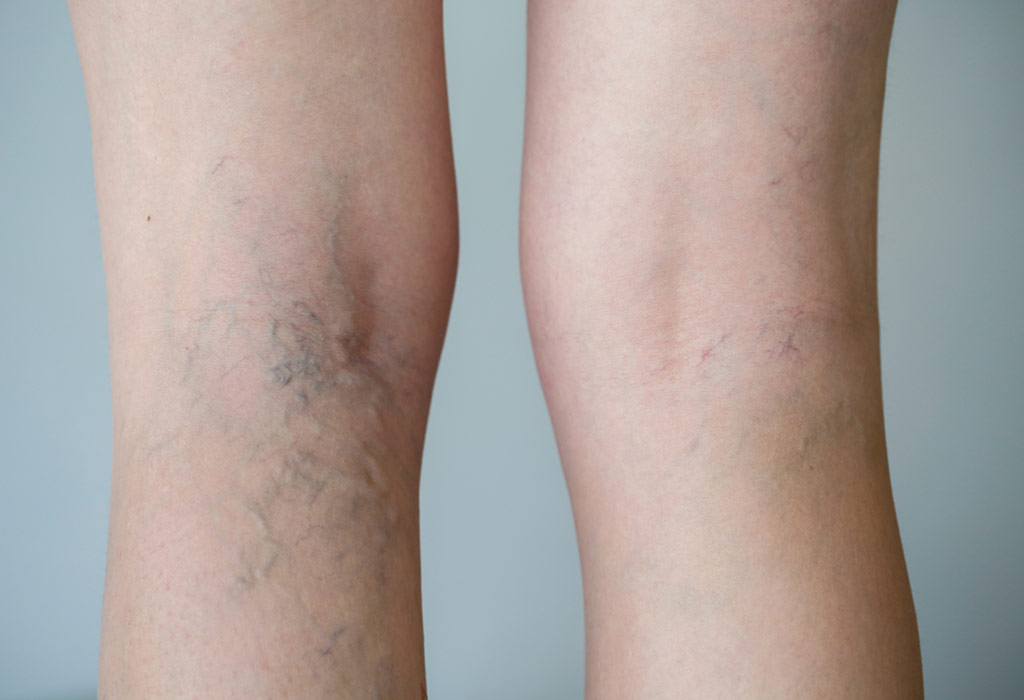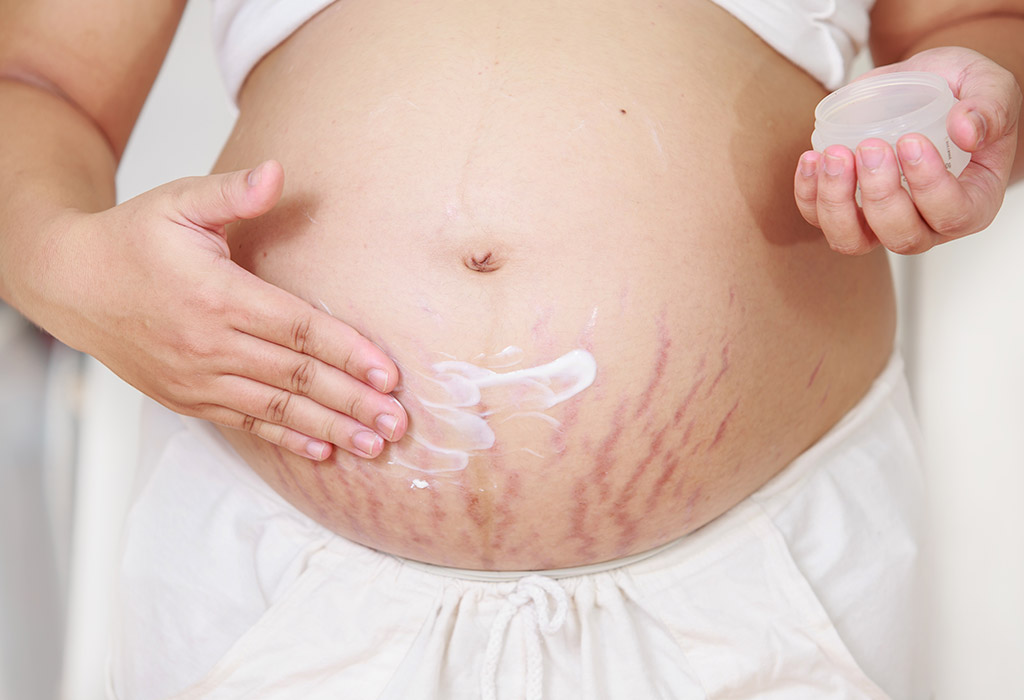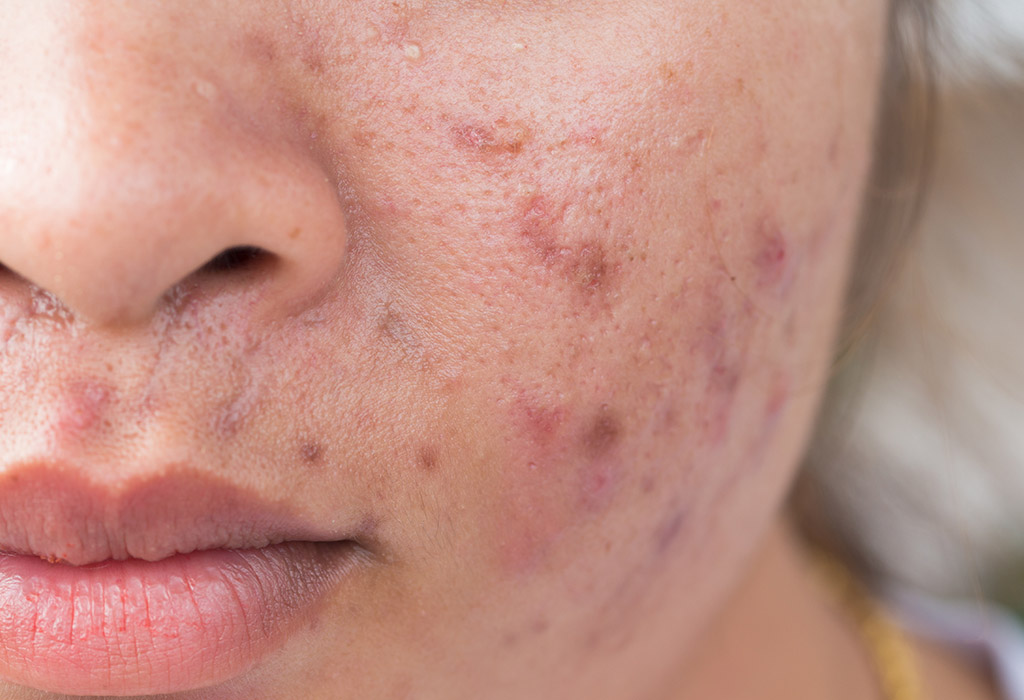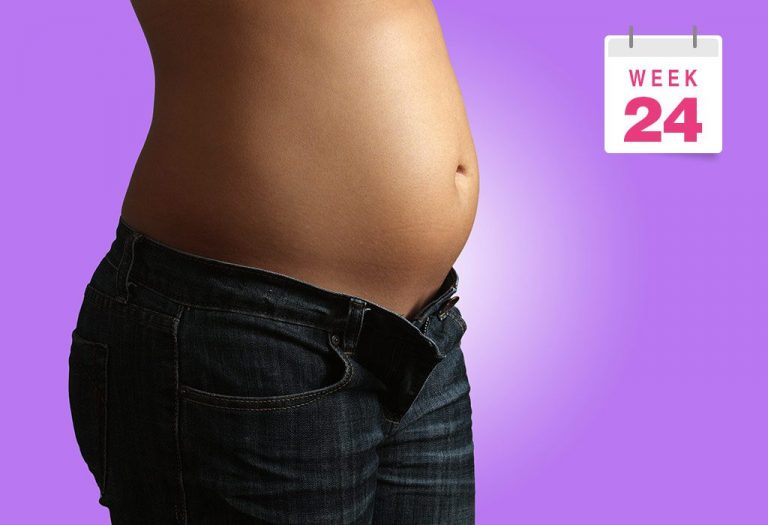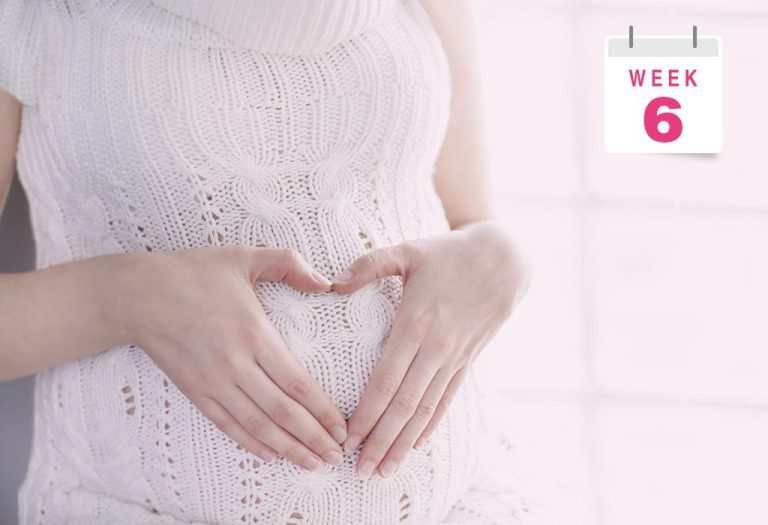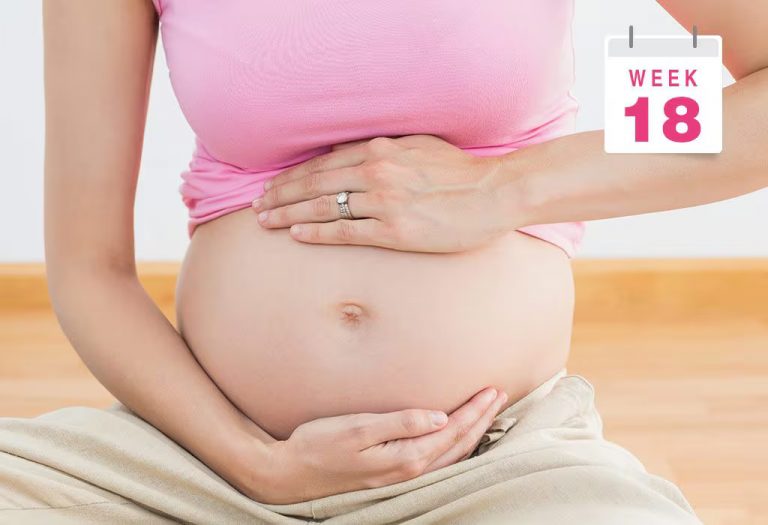21 Weeks Pregnant: Symptoms, Ultrasound, & Belly Size

You are slowly getting closer to the day you meet your little bundle of joy. At twenty-one weeks pregnant, you will notice your baby becoming more active, and you’ll feel their movements more distinctly. At the 21st week, you will be able to feel your baby more than usual. This is an exciting milestone as your little one continues to grow and develop. You will also begin to experience a few more symptoms, for which you will need some relief. Here is a list of suggestions and answers to any questions you might be having about your 21st week of pregnancy!
Your Baby’s Growth During Pregnancy – Week 21
At week 21, your little one will begin to taste his food, as the taste buds start to form. Even though the baby obtains nutrition by swallowing amniotic fluid, what you eat will flavour the fluid itself. Some studies have shown that babies prefer the same foods that their mothers ate during the pregnancy. In addition to taste, your baby now has his limbs proportionately developed, allowing for coordinated control over movements that you will start to experience as kicking or pushing. As the foetus is still rather small, you will be unable to tell which part of his body is pushing against your belly. Developing senses like sight and sound make your baby aware of your daily habits, and might even recognize your voice. Eyebrows, eyelashes, and eyelids have formed, although the irises have not got their colour in yet.
21 Weeks in Pregnancy Is How Many Months?
At 21 weeks pregnant, you are in your fifth month of pregnancy. Pregnancy is typically divided into three trimesters, with 21 weeks falling in the second trimester. Since a full-term pregnancy lasts about 40 weeks, 21 weeks marks just over the halfway point!
What Is the Baby’s Size?
What is the 21-week fetus size? At 21 weeks pregnant, the baby’s size is around 24 to 25 cm in length from head to toe, the same size as a large carrot. His weight is approximately 450 to 500 grams, and he is slowly pushing against your organs.
Common Body Changes
During the 21st week, there are some body changes during pregnancy that you will come to expect:
1. Varicose Veins
With your baby getting bigger, the veins in your legs experience more and more pressure. This is worsened by progesterone levels in your blood, leading to varicose veins.
2. Stretch Marks
Your tummy, thighs, hips, and buttocks will begin to bear the brunt of your expanding pregnancy bump and weight gain. These stretch marks appear as dark streaks caused by the tearing of the supportive tissue below the skin. The lighter skinned you are, the higher your chance of getting them. They usually don’t go away after birth but do become a lot less visible. Do not worry or panic about them.
3. Spider Veins
Small veins with a radial pattern like tree branches might appear on feet, hands or face. Luckily, they usually go away after you give birth.
4. Worse Acne
The hormonal flux surging through your body will wreak havoc with the oil levels in your skin, leading to acne breakouts. However, do not use oral or topical acne medication as they may cause complications to you and the baby.
Symptoms of Pregnancy at Week 21
The symptoms you will experience during your 21st week might indicate how you will feel for the final trimester. Some of them are:
- Braxton Hicks Contractions: These are contractions experienced by your body even before labour, as a form of practice for the real event. If they begin to cause discomfort, contact your doctor immediately.
- Discharge from Breasts: Milk or yellowish colostrum will leak from your breasts, as the milk ducts are fully functional at this point. This is not painful. However, it might cause embarrassment, so carry around some tissues or wet wipes with you.
- Irritated Skin: Your stretched belly skin will tend to become drier than usual and might even get chapped. The generous use of moisturizer should solve your problem.
- Cramps in Legs: This is a very common symptom, most likely caused by your legs now carrying more weight than they are used to. Do stretching exercises or get leg massages for relief.
- Inflamed Gums: Your gums will be a lot more sensitive than usual, so take care to brush your teeth gently.
Belly at 21 Weeks of Pregnancy
21 weeks of carrying your baby around will put a strain on your entire body. As the 21 weeks pregnant bump continues to grow, you may find that the belly button turns flat or pop out in certain cases.
You will be around 5-6 kg heavier than usual. This includes the 21 week fetus weight, amniotic fluid, placenta, uterus, increased blood and other fluids, fat and protein storage in the breasts, and so on. You could keep your uterine and pelvic muscles in tip-top shape by doing Kegel exercises.
21 Weeks Ultrasound
If you get your mid-pregnancy ultrasound scan this week, you will be able to see the intricate details of your baby’s body such as its heart chambers and brain hemispheres. Details of your little one’s limbs, sense organs, and hair will also be visible in the sonogram at 21 weeks pregnant. You may also find out the sex of your foetus at this stage in the 3D ultrasound; however, doing so is illegal in India to combat the rates of female foeticide.
At this stage, you must try to get the fetal echocardiography done to rule out any congenital heart diseases.
Development of Twins at 21 Weeks
At 21 weeks, twins are growing rapidly and making significant developmental strides. Each baby is approximately the size of a large banana, measuring about 10.5 inches from head to toe and weighing around 12 to 15 ounces. Their skin, though still thin and translucent, is beginning to develop a protective layer of vernix caseosa. Internal organs, such as the digestive system, are maturing, and their taste buds are becoming more refined, allowing them to detect flavours from the amniotic fluid. The nervous system is advancing, enabling more coordinated movements, and they may even react to external stimuli like sound. These milestones highlight the incredible journey of twin development at 21 weeks!
What to Eat
Your need for iron has never been higher than it is at this point, as you are producing a lot more red blood cells to supply your baby with whatever it needs. If your iron reserves fall low, you might become anaemic, which could lead to fatigue, shortness of breath, and even loss of consciousness. The best 21st week pregnancy foods are those that are rich in iron, such as spinach, red meat, leguminous veggies, and fish are recommended. Iron supplements are also often prescribed to deal with the situation.
Avoiding caffeine will enhance the absorption of iron, so cut down on those twice-daily espresso shots!
Consume foods with a lot of Vitamin C like lemons, grapes, watermelons, and chillis. If being overweight or obese is a problem, then changing your diet to include whole-grain foods, fruits, and vegetables, and avoiding processed food and refined sugar, should do the trick.
Above all else, remember to stay hydrated with at least 2 to 3 litres of water a day.
Tips & Care
You may need to learn how to deal with the most common issues such as heartburn, haemorrhoids, back pain, and so on. Visit your doctor regularly to learn more about what you could do to protect yourself and your baby.
Dos
- Keep your leg muscles stretched and relaxed to avoid getting cramps. If necessary, visit a physiotherapist for help with the same.
- Talk or sing to your baby for at least a couple of hours every day. The baby will learn to recognise and grow attached to your voice. Playing the baby music will also help it rest better.
Don’ts
- Don’t forget your regular exercise, sleeping on the left side of your body, and keeping your lower limbs propped up.
- Pregnant women are strongly recommended to take vaccinations for whooping cough at this point, so don’t forget to ask your doctor for further advice.
What You Need to Shop For
The most important thing for you to spend some money on is maternity clothing. For sleepwear, you can opt for Bella Mama’s night suits, which have a double layer and nursing access just below the panel. There’s also a pleat in the front which effectively provides ample space for the growing belly. Or you can even go for the 100% cotton nighties which can be worn post-pregnancy as well. These clothes are comfortable and supportive for someone in the middle of her pregnancy. There are several online stores to choose from. It might be a good idea to also invest in pregnancy books, maternity bras, and accessories for your baby’s room.
When to Consult the Doctor
While many symptoms are a normal part of pregnancy, some signs require immediate medical attention to ensure the safety of both you and your baby. Here are some situations when you should consult a doctor:
- Severe or persistent abdominal pain: Intense or continuous pain in the abdomen could indicate complications such as preterm labour or placental issues.
- Heavy bleeding or unusual spotting: While light spotting can be normal, heavy bleeding or clots should be evaluated right away.
- High fever or signs of infection: A fever above 100.4°F (38°C), chills, or other infection symptoms could pose risks and require medical intervention.
- Decreased fetal movements: If you notice a significant drop in your baby’s usual activity, it’s crucial to consult your doctor to check on their well-being.
- Severe swelling or sudden weight gain: Swelling in the face or hands or sudden weight gain may indicate preeclampsia, a condition that requires prompt attention.
- Blurred vision or severe headaches: These symptoms could signal high blood pressure or other underlying issues that need immediate care.
FAQs
1. Can your baby recognise sounds at 21 weeks?
Yes, at 21 weeks, your baby’s ears are fully developed, and they can start recognising sounds from outside the womb. They may respond to your voice, music, or other familiar noises, which can help with bonding even before birth.
2. Why does your belly feel tight at 21 weeks?
A tight feeling in the belly at 21 weeks can be due to Braxton Hicks contractions, which are practice contractions preparing your body for labour. These are usually mild and irregular but should be monitored if they become painful or frequent.
3. Is it common to have strange dreams at 21 weeks?
Yes, many women experience vivid or unusual dreams during this stage of pregnancy. These are thought to be influenced by hormonal changes, anxiety, or excitement about the upcoming arrival of the baby.
Early preparation for an effortless pregnancy and delivery is the key to reducing a lot of stress that comes with it!
References/Resources:
1. 21 Weeks Pregnant; American Pregnancy Association; https://americanpregnancy.org/healthy-pregnancy/week-by-week/21-weeks-pregnant/
2. You and your baby at 21 weeks pregnant; NHS; https://www.nhs.uk/pregnancy/week-by-week/13-to-27/21-weeks/
3. Week 21; NHS; https://www.nhs.uk/start-for-life/pregnancy/week-by-week-guide-to-pregnancy/2nd-trimester/week-21/
4. Stretch marks: why they appear and how to get rid of them; American Academy of Dermatology Association; https://www.aad.org/public/cosmetic/scars-stretch-marks/stretch-marks-why-appear
5. Weight Gain During Pregnancy; American College of Obstetricians and Gynecologists Clinical; https://www.acog.org/clinical/clinical-guidance/committee-opinion/articles/2013/01/weight-gain-during-pregnancy
6. Nutrition During Pregnancy: FAQs; American College of Obstetricians and Gynecologists Clinical; https://www.acog.org/womens-health/faqs/nutrition-during-pregnancy
7. Ultrasound in Pregnancy; Cleveland Clinic; https://my.clevelandclinic.org/health/diagnostics/9704-ultrasound-in-pregnancy
Previous Week: 20 Weeks Pregnant
Next Week: 22 Weeks Pregnant
Was This Article Helpful?
Parenting is a huge responsibility, for you as a caregiver, but also for us as a parenting content platform. We understand that and take our responsibility of creating credible content seriously. FirstCry Parenting articles are written and published only after extensive research using factually sound references to deliver quality content that is accurate, validated by experts, and completely reliable. To understand how we go about creating content that is credible, read our editorial policy here.







